2026 London Writers Awards judge for Literary Fiction – Ashani Lewis, shares her top five books that have influenced her as a writer. This list is brimming with inspiration for writers applying to the award this year.
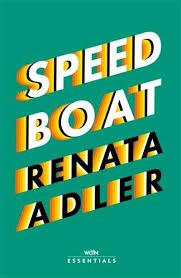
1. Speedboat, Renata Adler
Adler sweeps through a range of miniature stories in a single narrative with a journalistic conciseness that I immediately wanted to try my hand at. It’s almost shallow: we get a perfect paragraph’s worth on ‘a polo-playing Argentine existential psychiatrist’ or ‘the wife of the Italian mineral-water tycoon’ and then never hear from them again. Speedboat is a recent read – my sister gave it to me for Christmas – but it occupies the same space as a couple of other books that had inspired me much earlier, including Tama Janowitz’s Slaves of New York.
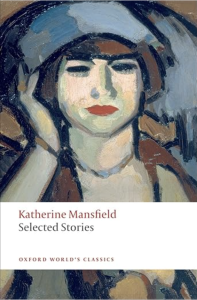 2. Selected Stories, Katherine Mansfield
2. Selected Stories, Katherine Mansfield
I had the Oxford World’s Classics Selected Stories when I was a kid, which had this fantastic oil painting of a woman on the cover, with a kind of greenish face and red lipstick, whom I always assumed was Katherine Mansfield. I remember writing my first proper short story and trying to emulate the self-contained completeness of Mansfield’s short fiction. A Cup of Tea, to me, is the perfect short story.
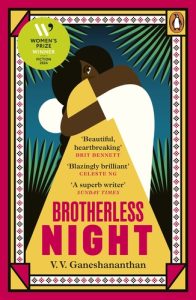
3. Brotherless Night, V. V. Ganeshananthan
I’m half Sri Lankan Tamil, and grew up hearing account after account of the civil war. Unbelievably, I had never read a book set in post-colonial Sri Lanka until three years ago, when Shehan Karunatilaka’s The Seven Moons of Maali Almeida won the Booker Prize. The Seven Moons was revelatory, as was Charu Nivedita’s Zero Degree, (not set in Sri Lanka, but following the Indian Tamil experience), but Brotherless Night has its hand in my heart. It was an immeasurably intense reading experience. Ganeshananthan has a journalism background, and the book is forensically researched, but it’s also bluntly, lucidly emotional. Brotherless Night has helped me think about how to write about that part of my family’s history, which is something that I’ve been doing recently, both for my upcoming novel, Suckerfish, and for another novel in progress.
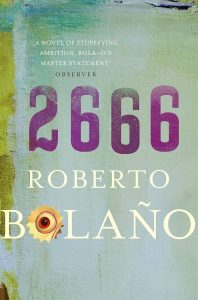 4. 2666, Roberto Bolaño.
4. 2666, Roberto Bolaño.
This absolute monolith is a very particular reading experience. I carted it around with me for about a month before I was finished, and The Part About The Crimes is particularly heavy going, but it turns its readers into evangelists. I was converted to Bolaño and now I attempt to convert others. The novel is full of unanswered riddles, or riddles that seem to have been answered in some elusive, sub-surface way that might reveal themselves on a fifth or sixth read. It’s a very good writing lodestar for when I’m tempted to overexplain.
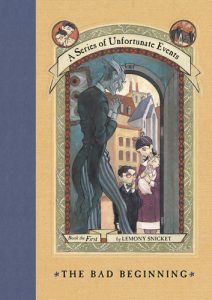 5. A Series of Unfortunate Events, Lemony Snicket
5. A Series of Unfortunate Events, Lemony Snicket
Genius series, postmodernist literature for kids. The author, Lemony Snicket, is a fictional self-insert, constantly evading his own execution while telling the story of the Baudelaire orphans, who are mixed up in the same schism-stricken secret society responsible for Snicket’s predicament. Snicket is brilliantly unpatronizing, prone to deliberately unwieldy digressions and cryptic asides. ASOUE gave me a taste for reference and metafiction that I’ve never lost. (Years later, reading Italo Calvino’s If on a winter’s night a traveller and Borges’ Ficciones, I felt a thrill of recognition.)